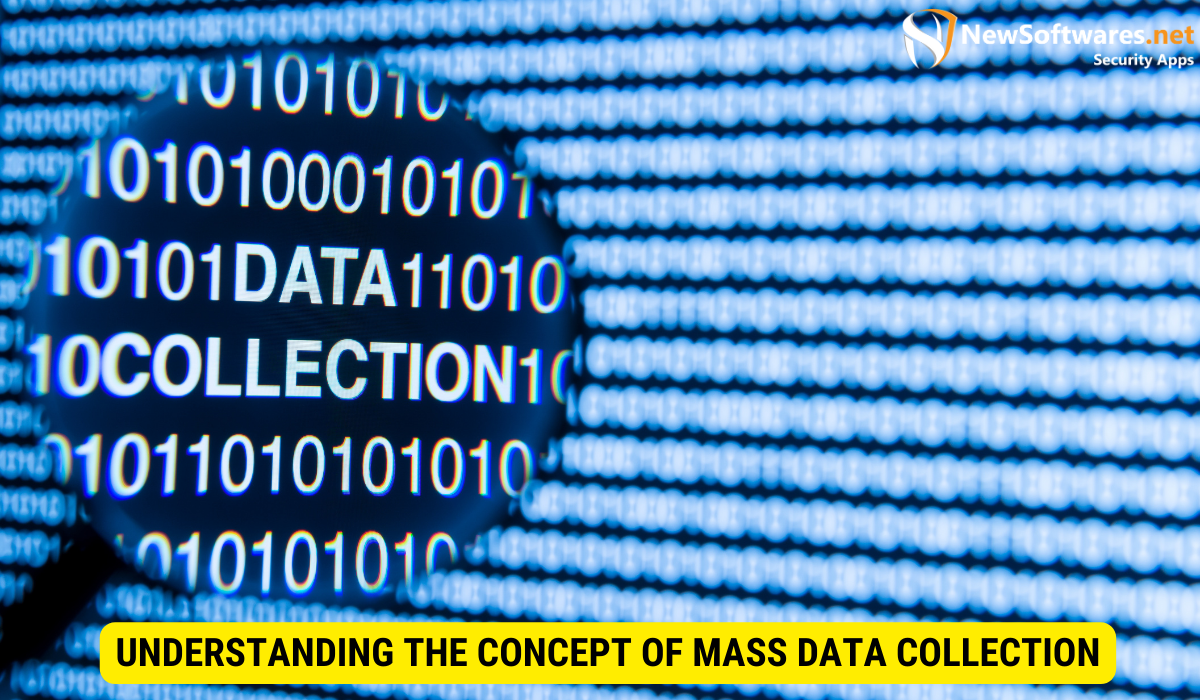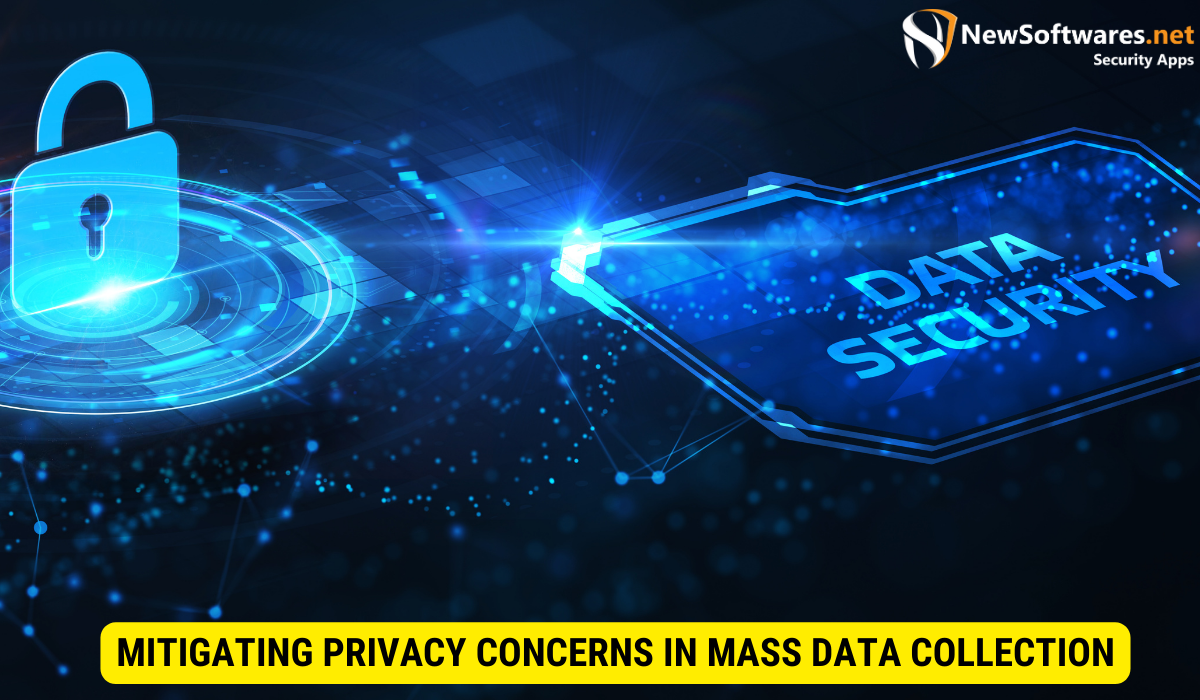Privacy concerns arising from mass data collection include increased risks of identity theft and fraud, potential for unwanted surveillance, and the threat of personal information leakage due to data breaches.
Mass data collection poses significant privacy concerns in today’s digital age. With the increasing reliance on technology and the widespread collection of personal information, it is crucial to understand the implications and risks associated with this practice.
Understanding the Concept of Mass Data Collection

Mass data collection refers to the systematic gathering of large amounts of information from various sources, such as websites, social media platforms, and mobile applications. This data is collected and analyzed to gain insights, make informed decisions, and personalize user experiences. However, this practice raises concerns regarding the protection of privacy and the ethical use of personal information.
Defining Mass Data Collection
Mass data collection involves the collection of a vast amount of data from individuals, often without their explicit consent or awareness. This data can include personal details, browsing history, purchasing behavior, and even location information. The sheer volume and complexity of the collected information make it challenging to ensure privacy and data security.
Mass data collection has become an integral part of many industries, including marketing, finance, healthcare, and government. Companies use this data to understand consumer behavior, improve products and services, and target advertisements more effectively. For example, e-commerce platforms analyze customer browsing and purchase history to recommend personalized products, enhancing the overall shopping experience.
However, the collection of personal information without explicit consent raises ethical concerns. Individuals may feel their privacy is being invaded, and there is a risk of data misuse or unauthorized access. Striking a balance between data collection for legitimate purposes and respecting individual privacy rights is a complex challenge that requires careful consideration.
The Role of Technology in Data Collection
Advancements in technology have made mass data collection more accessible and efficient. Tracking tools such as cookies, device fingerprinting, and data analytics algorithms enable companies to gather immense amounts of information. These technologies allow organizations to track user behavior, preferences, and interactions across various digital platforms.
For instance, cookies are small text files stored on a user’s device that track their online activities. They enable websites to remember user preferences and provide a personalized browsing experience. However, cookies can also be used to collect data without the user’s explicit consent, leading to concerns about privacy invasion.
Device fingerprinting is another technology used for data collection. It involves gathering unique device characteristics, such as browser type, screen resolution, and installed plugins, to create a unique identifier for a particular device. This identifier allows companies to track user behavior across multiple websites and platforms, even if cookies are cleared or disabled.
Data analytics algorithms play a crucial role in processing and analyzing the collected data. These algorithms can identify patterns, trends, and correlations within the data, providing valuable insights for decision-making. However, there is a need for transparency and accountability in the use of these algorithms to ensure fair and ethical data analysis practices.
While technology has made mass data collection more efficient, it has also raised concerns about privacy and data security. The potential for data breaches, unauthorized access, and the misuse of personal information is a significant challenge that organizations must address. Implementing robust security measures, obtaining informed consent, and providing individuals with control over their data are essential steps in mitigating these risks.
The Intersection of Privacy and Data Collection
Privacy is a fundamental right that individuals expect and deserve in the digital era. The collection and use of personal information without proper safeguards can compromise privacy. It is essential to recognize the significance of privacy in protecting individuals’ identities, reputations, and personal lives.
In today’s interconnected world, where technology plays a central role in our daily lives, privacy has become even more critical. The digital age has brought about unprecedented opportunities for communication, innovation, and convenience. However, it has also created new challenges and risks to our privacy.
The Importance of Privacy in the Digital Age
Privacy plays a crucial role in ensuring individuals’ autonomy and control over their personal information. It safeguards against identity theft, financial fraud, and other malicious activities. Moreover, privacy promotes freedom of expression, personal security, and the ability to make informed choices without unwarranted interference or surveillance.
Imagine a world without privacy. Every aspect of our lives, from our online activities to our offline interactions, would be subject to constant scrutiny and surveillance. Our thoughts, opinions, and personal preferences would be laid bare for the world to see. This lack of privacy would not only erode our sense of self but also limit our ability to explore new ideas, challenge societal norms, and express ourselves freely.
Privacy also plays a crucial role in fostering trust between individuals and the digital platforms they interact with. When users feel confident that their personal information is being handled responsibly and with their consent, they are more likely to engage in online activities, share their thoughts and opinions, and participate in e-commerce transactions. Without privacy, this trust would be shattered, leading to a decline in online interactions and economic growth.
How Mass Data Collection Impacts Privacy
Mass data collection can have far-reaching implications for privacy. The aggregation and analysis of large datasets can potentially reveal sensitive and personal information, such as medical history, political affiliations, or intimate preferences. When data is collected indiscriminately and without proper consent, individuals’ right to privacy can be violated, leading to potential harm and discrimination.
Consider the example of targeted advertising. Companies collect vast amounts of data about individuals’ online behavior, preferences, and demographics to deliver personalized advertisements. While this may seem harmless on the surface, it raises concerns about the level of control individuals have over their personal information. Without proper safeguards and transparency, individuals may feel manipulated or exploited, as their private data is used to influence their purchasing decisions or shape their online experiences.
Furthermore, the potential for data breaches and unauthorized access to personal information is a constant threat in the age of mass data collection. The more data that is collected and stored, the greater the risk of a security breach. This can have severe consequences for individuals, ranging from financial loss to reputational damage. It is crucial for organizations to implement robust security measures and data protection protocols to mitigate these risks and ensure individuals’ privacy is safeguarded.
In conclusion, privacy is a fundamental right that must be protected in the digital age. The collection and use of personal information should be subject to proper safeguards and consent. Mass data collection, while offering potential benefits, also poses significant risks to privacy. It is essential for individuals, organizations, and policymakers to strike a balance between the benefits of data collection and the protection of privacy rights to ensure a safe and secure digital environment for all.
Specific Privacy Concerns Related to Mass Data Collection
Several specific privacy concerns arise from mass data collection practices, highlighting the risks individuals face in an increasingly data-driven world.
Identity Theft and Fraud Risks
Mass data collection increases the chances of identity theft and financial fraud. When hackers or malicious actors gain access to large databases of personal information, such as names, addresses, and social security numbers, they can use this data to impersonate individuals or carry out fraudulent activities.
Potential for Unwanted Surveillance
Mass data collection, especially when combined with surveillance technologies, raises concerns about unwanted monitoring and intrusions into personal lives. Governments and corporations may have the ability to track individuals’ activities, location, and online behavior, eroding privacy and potentially enabling manipulation or discrimination.
The Threat of Personal Information Leakage
Data breaches and leaks pose a significant privacy risk. Massive repositories of personal information are attractive targets for hackers looking to exploit vulnerabilities and gain unauthorized access to sensitive data. When personal information is exposed, individuals can experience identity theft, financial losses, and reputational damage.
Legal and Ethical Implications of Mass Data Collection
The increasing prevalence of mass data collection raises questions about the legal and ethical boundaries that should govern these practices.
Current Laws Governing Data Collection and Privacy
Laws and regulations vary across jurisdictions, but many countries have implemented measures to protect individuals’ privacy rights. These laws often define data protection principles, require informed consent for data collection, and outline penalties for non-compliance. However, enforcement and adaptation to technological advancements remain ongoing challenges.
Ethical Dilemmas in Balancing Data Collection and Privacy
The ethical considerations surrounding mass data collection center on the responsible and transparent use of personal information. Organizations must strike a balance between utilizing data to improve services and respecting individuals’ privacy rights. Ethical frameworks such as data minimization, purpose limitation, and anonymization can guide organizations in mitigating privacy concerns.
Mitigating Privacy Concerns in Mass Data Collection

To address the privacy concerns arising from mass data collection, both organizations and individuals can take proactive measures to protect personal information and uphold privacy rights.
Best Practices for Protecting Privacy
Organizations should implement robust privacy policies and practices to ensure transparency and informed consent when collecting personal data. They should also prioritize data security measures, such as encryption and access controls, to prevent unauthorized access and data breaches.
The Role of Encryption and Anonymization Techniques
Encryption and anonymization techniques can help protect personal information during data collection and storage. Encryption ensures that data is unreadable without the correct decryption key, while anonymization removes or masks personally identifiable information, reducing the risk of data breaches and unauthorized identification.
Future Directions for Privacy Protection in Data Collection
As technology continues to advance, privacy protection must evolve alongside it. Solutions such as privacy-enhancing technologies, decentralized and user-centric data models, and stronger legal frameworks are being explored to better safeguard individuals’ privacy rights while allowing data-driven innovation to thrive.
Key Takeaways
- Mass data collection poses significant privacy concerns and requires careful consideration of legal, ethical, and technological dimensions.
- Privacy is a fundamental right that should be protected in the digital age, as it ensures individual autonomy and control over personal information.
- Specific concerns related to mass data collection include identity theft and fraud risks, potential for unwanted surveillance, and the threat of personal information leakage.
- Laws and regulations governing data collection and privacy attempt to strike a balance between data utilization and privacy protection.
- Mitigating privacy concerns in mass data collection involves implementing best practices, using encryption and anonymization techniques, and exploring future solutions.
FAQs
Q: Why is privacy important in the context of mass data collection?
A: Privacy is important because it protects individuals’ autonomy, personal security, and freedom of expression. Mass data collection can compromise these rights if personal information is misused or falls into the wrong hands.
Q: How can individuals protect their privacy in the face of mass data collection?
A: Individuals can protect their privacy by being mindful of the information they share, using privacy settings on websites and apps, and staying informed about privacy policies. Additionally, using secure and encrypted communication channels can help safeguard personal data.
Q: What steps can organizations take to ensure responsible data collection and privacy protection?
A: Organizations can adopt privacy-by-design principles, obtain informed consent for data collection, implement stringent security measures, and regularly assess and update privacy policies. They should also prioritize transparent communication with users regarding data handling practices.
Conclusion
In conclusion, mass data collection raises significant privacy concerns due to the potential for unauthorized access, data breaches, and invasive surveillance. Striking a balance between data utilization and privacy protection is crucial for organizations and individuals alike. By implementing best practices, using encryption and anonymization techniques, and advocating for stronger legal frameworks, we can navigate the challenges posed by the mass collection of data while safeguarding privacy rights in the digital age
